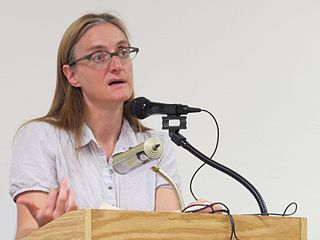A Quote by Sam Keen
There is the extreme of hopelessness and the inevitability of doom, a deep despair that comes from the sense that our industrial, consuming society is jeopardizing the planet.
Quote Topics
Related Quotes
...we should all fortify ourselves against the dark hours of depression by cultivating a deep distrust of the certainties of despair. Despair is relentless in the certainties of its pessimism. But we have seen again and again, from our own experience and others', that absolute statements of hopelessness that we make in the dark are notoriously unreliable. Our dark certainties are not sureties.
I don't think people are like, "I'm going to save the planet by planting my own herbs." But on environmental issues like climate change, there's a sense of hopelessness and despair. Maybe it's really a small gesture but if you can have a garden it may make you feel like you're helping in some way, or that you're making a connection. You can't change the world but you can change your backyard.
Yet if you go to the supermarket and look at food that's produced through industrial agriculture, look at what's happened to the prices. Have they been going down? They've been going up and they will continue to go up. So the choice is either, do we hitch onto a system of agriculture that's doomed and will doom the planet with it, and go along the route of industrial agriculture, or do we want to shift to a kind of system that we know is going to be, in the long run, cheaper, because we'll have a planet left at the end of it? We need to factor that cost in.
It is important to recognize the power of our emotions-and to take responsibility for them by creating a light and positive atmosphere around ourselves. This attitude of joy that we create helps alleviate states of hopelessness, loneliness, and despair. Our relationships with others thus naturally improve, and little by little the whole of society becomes more positive and balanced.
I'm interested in anything that deals with our planet, in our planet, outside our planet, the universe, universes, galactic, dimensional, subterranean. That's deep stuff that everybody needs to focus on: What is your niche on this planet? Why are we here? Why are there roaches and water-bugs and all that type of stuff?
The profound political changes we need in order to heal our planet will not come about through fragmented problem solving or intellectual analyses that overlook the deepest yearnings and intuitions of the heart....As we begin to cultivate a rich inner life and experience our connection with all life, we realize how little of what society tells us we need is actually important for our well-being....Green politics must address the spiritual vacuum of industrial society.
Industrial Society is not merely one containing 'industry,' large-scale productive units capable of supplying man's material needs in a way which can eliminate poverty: it is also a society in which knowledge plays a part wholly different from that which it played in earlier social forms, and which indeed possesses a quite different type of knowledge. Modern science is inconceivable outside an industrial society: but modern industrial society is equally inconceivable without modern science. Roughly, science is the mode of cognition of industrial society, and industry is the ecology of science.



































